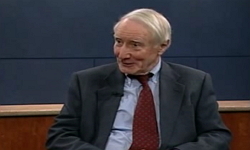Herman Melville``s Billy Budd examines the possibility of democratic leadership in the increasingly hierarchical and imperial American society at the end of the 19th century. On the surface of the narrative, Melville envisions the grim fate of democra...
http://chineseinput.net/에서 pinyin(병음)방식으로 중국어를 변환할 수 있습니다.
변환된 중국어를 복사하여 사용하시면 됩니다.
- 中文 을 입력하시려면 zhongwen을 입력하시고 space를누르시면됩니다.
- 北京 을 입력하시려면 beijing을 입력하시고 space를 누르시면 됩니다.


『빌리 버드』-제국의 위계질서, 그리고 민주적 지도력의 가능성 = Billy Budd: The Possibility of Democratic Leadership within the Rising Empire`s Hierarchy
한글로보기https://www.riss.kr/link?id=A101945172
- 저자
- 발행기관
- 학술지명
- 권호사항
-
발행연도
2016
-
작성언어
Korean
-
주제어
『빌리 버드』 ; 민주적 지도력 ; 위계질서 ; 제국 ; 동성애 ; Billy Budd ; democratic Leadership ; hierarchy ; empire ; homosexuality
-
등재정보
KCI등재,SCOPUS
-
자료형태
학술저널
- 발행기관 URL
-
수록면
283-307(25쪽)
-
KCI 피인용횟수
0
- DOI식별코드
- 제공처
- 소장기관
-
0
상세조회 -
0
다운로드
부가정보
다국어 초록 (Multilingual Abstract)
Herman Melville``s Billy Budd examines the possibility of democratic leadership in the increasingly hierarchical and imperial American society at the end of the 19th century. On the surface of the narrative, Melville envisions the grim fate of democratic leadership, as represented by the tragedy of an 18th-century British naval warship, the Bellipotent . Terrified by the prospect of mutiny under the necessity of impressment, military commander Vere and policeman Claggart try to "terrorize" the lower-class citizens on the Bellipotent into "base subjection." Billy-the symbol of democratic leadership-is therefore ruthlessly consumed to gratify the military leaders`` secretive political ambition and homosexuality. In the subtext, however, Melville subverts this realistic conclusion, first, by describing the innocent boy``s death as a sacred ritual of apotheosis; second, by revealing how powerfully his fellow sailors are affected by this holy scene; and, third, by suggesting that Nelson``s victorious military career relies on the ordinary seamen``s voluntary allegiance to him, whereas Vere``s career fizzles out due to the utter lack of it. By inserting the romantic element of Billy``s apotheosis into his realistically tragic novel, the author thus emphasizes that democratic leadership as shown by Billy and Nelson is the only key to the survival of the rising American empire.
참고문헌 (Reference)
1 Gilmore, Michael T., "‘Speak, man!’: Billy Budd in the Crucible of Reconstruction" 21 (21): 492-517, 2009
2 Melville, Herman, "Tales, Poems, and Other Writings" Modern Library 2001
3 Herbert, T. Walter, "Stronger than the Sword: Billy Budd and the Contagion of Democracy" 16 (16): 57-73, 2014
4 Shulman, Robert., "Social Criticism & Nineteenth-Century American Fictions" U of Missouri P 1989
5 Reynolds, Larry J., "Righteous Violence: Revolution, Slavery, and the American Renaissance" U of Georgia P 2011
6 Parker, Hershel, "Reading Billy Budd" Northwestern UP 1990
7 Phillips, Kathy J., "One of Those Aliens’: Empire and Homosexuality in Melville’s Billy Budd" 13 (13): 163-174, 2000
8 Wenke, John., "New Essays on Billy Budd" Cambridge UP 114-144, 2002
9 Bellamy, Edward, "Looking Backward: 2000-1887" Hendricks House 1982
10 Cameron, Sharon, "Impersonality: Seven Essays" U of Chicago P 2007
1 Gilmore, Michael T., "‘Speak, man!’: Billy Budd in the Crucible of Reconstruction" 21 (21): 492-517, 2009
2 Melville, Herman, "Tales, Poems, and Other Writings" Modern Library 2001
3 Herbert, T. Walter, "Stronger than the Sword: Billy Budd and the Contagion of Democracy" 16 (16): 57-73, 2014
4 Shulman, Robert., "Social Criticism & Nineteenth-Century American Fictions" U of Missouri P 1989
5 Reynolds, Larry J., "Righteous Violence: Revolution, Slavery, and the American Renaissance" U of Georgia P 2011
6 Parker, Hershel, "Reading Billy Budd" Northwestern UP 1990
7 Phillips, Kathy J., "One of Those Aliens’: Empire and Homosexuality in Melville’s Billy Budd" 13 (13): 163-174, 2000
8 Wenke, John., "New Essays on Billy Budd" Cambridge UP 114-144, 2002
9 Bellamy, Edward, "Looking Backward: 2000-1887" Hendricks House 1982
10 Cameron, Sharon, "Impersonality: Seven Essays" U of Chicago P 2007
11 Schlup, Leonard C., "Historical Dictionary of the Gilded Age" M.E. Sharpe 2003
12 Sedgwick, Eve K., "Epistemology of the Closet" U of California P 2008
13 Thomas, Brook., "Cross-examinations of Law and Literature: Cooper, Hawthorne, Stowe, and Melville" Cambridge UP 1987
14 Hunt, Lester., "Billy Budd: Melville’s Dilemma" 26 (26): 273-295, 2002
15 Franklin, H. Bruce, "Billy Budd and Capital Punishment: A Tale of Three Centuries" 69 (69): 337-359, 1997
동일학술지(권/호) 다른 논문
-
Speculative Fictions of A Divided World: Reading Octavia E. Butler in South Korea
- 한국영어영문학회
- ( Shelley Streeby )
- 2016
- KCI등재,SCOPUS
-
From Nietzsche`s Overhuman to the Posthuman of Transhumanism: Transcultural Discourses
- 한국영어영문학회
- ( Stefan Lorenz Sorgner )
- 2016
- KCI등재,SCOPUS
-
Father and Daughter: Leslie Stephen and Virginia Woolf
- 한국영어영문학회
- ( Ira Nadel )
- 2016
- KCI등재,SCOPUS
-
“. . . only a girl”? Labor, Gender, and Murderous Constituencies in Alice Munro`s “Boys and Girls”
- 한국영어영문학회
- ( Dan Disney )
- 2016
- KCI등재,SCOPUS
분석정보
인용정보 인용지수 설명보기
학술지 이력
| 연월일 | 이력구분 | 이력상세 | 등재구분 |
|---|---|---|---|
| 2022 | 평가예정 | 계속평가 신청대상 (등재유지) | |
| 2017-01-01 | 평가 | 우수등재학술지 선정 (계속평가) | |
| 2014-10-08 | 학회명변경 | 영문명 : 미등록 -> The English Language and Literature Association of Korea |  |
| 2013-01-01 | 평가 | 등재학술지 유지 (등재유지) |  |
| 2010-01-01 | 평가 | 등재학술지 유지 (등재유지) |  |
| 2008-01-01 | 평가 | 등재학술지 유지 (등재유지) |  |
| 2006-01-01 | 평가 | 등재학술지 유지 (등재유지) |  |
| 2005-10-14 | 학술지등록 | 한글명 : 영어영문학외국어명 : The Journal of English Language and Literature |  |
| 2004-01-01 | 평가 | 등재학술지 유지 (등재유지) |  |
| 2001-01-01 | 평가 | 등재학술지 선정 (등재후보2차) |  |
| 1998-07-01 | 평가 | 등재후보학술지 선정 (신규평가) |  |
학술지 인용정보
| 기준연도 | WOS-KCI 통합IF(2년) | KCIF(2년) | KCIF(3년) |
|---|---|---|---|
| 2016 | 0.06 | 0.06 | 0.1 |
| KCIF(4년) | KCIF(5년) | 중심성지수(3년) | 즉시성지수 |
| 0.18 | 0.2 | 0.384 | 0 |





 KCI
KCI KISS
KISS







